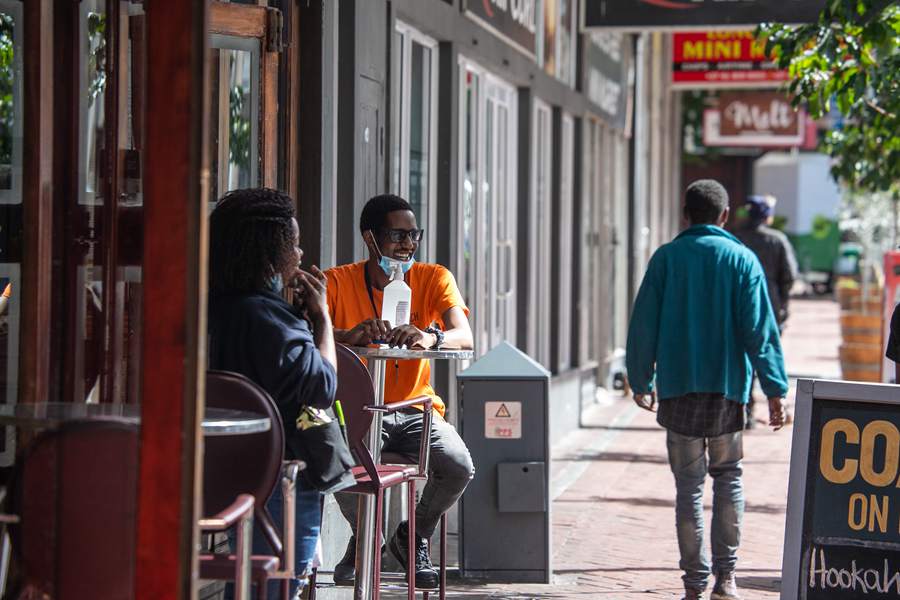S. African president warns of fourth wave as Omicron spreads to all provinces

People sit outside a bar on a commercial street in Cape Town, South Africa, Nov. 28, 2021. Travel bans on South Africa due to the new Omicron coronavirus variant will be "devastating" for the provincial economy as the local government is seeking for a recovery on its key tourism sector from COVID-19 impact, Western Cape provincial official said in a press release on Sunday. (Xinhua/Lyu Tianran)
JOHANNESBURG, Nov. 28 (Xinhua) -- With the Omicron variant now present in all provinces of South Africa, President Cyril Ramaphosa has raised the possibility that the country could enter the fourth wave soon if new cases continue to increase.
"The identification of Omicron coincides with a sudden increase in COVID-19 infections. If cases continue to rise, we can expect to see a fourth wave of infection in the next few weeks, if not sooner," Ramaphosa said in his televised speech on Sunday night.
His address to the nation followed a meeting of the Coronavirus Command Council after scientists recently discovered the new variant.
"We have seen an average of 1,600 new cases in the last 7 days, compared to just 500 new daily cases in the previous week, and 275 new daily cases the week before that. The proportion of COVID-19 tests that are positive has risen from around 2 percent to 9 percent in less than a week," the president said. "This is an extremely sharp increase in infections in a short period of time."
"We know that the variant is responsible for most of the infections found in Gauteng in the last two weeks and is now emerging in all other provinces," he added.
Given that only 35 percent of the adult population has been fully vaccinated so far and there is still a lot of hesitation to vaccinate, Ramaphosa announced that a working group has been set up to discuss the possibility of making vaccines mandatory to access public places such as public transport, workplaces, public events and public facilities.
"Government has set up a working group that will consult widely on the introduction of compulsory vaccination in certain activities and places," he said.
The task force will report to the Inter-Ministerial Committee on Immunisation, chaired by Deputy President David Mabuza, which will make recommendations to the Cabinet.
He said the first and the most powerful tool that mankind has is vaccination.
"Vaccination is by far the most important way to protect yourself and those around you against the Omicron variant, to reduce the impact of the fourth wave and to help restore the social freedoms we all yearn for," he said. "Vaccination is also vital to the return of our economy to full operation, to the resumption of travel and to the recovery of vulnerable sectors like tourism and hospitality."
Ramaphosa said the COVID-19 virus, like all viruses, does mutate and form new variants. The likelihood of the emergence of more severe forms of variants is increased significantly where people are not vaccinated.
"That is why we have joined many countries, organizations and people around the world who have been fighting for equal access to vaccines for everyone," he said. "We have said that vaccine inequality not only costs lives and livelihoods in those countries that are denied access, but that it also threatens global efforts to overcome the pandemic. The emergence of the Omicron variant should be a wake-up call to the world that vaccine inequality cannot be allowed to continue."
Photos
Related Stories
- U.S. highly alerted over Omicron with tailored vaccines prepared
- WHO says not clear weather Omicron more transmissible, causes more severe disease
- Opening ceremony for Chinese language and culture training course held at Confucius Institute affiliated with University of Johannesburg
- Online Chinese training program offered for South African tour guides
- Opening ceremony for South Africa-China joint training program in Mandarin and Chinese culture held online
Copyright © 2021 People's Daily Online. All Rights Reserved.










